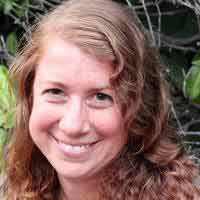When you click on a sponsoring school or program advertised on our site, or fill out a form to request information from a sponsoring school, we may earn a commission. View our advertising disclosure for more details.
“Something I love about my profession is that it always challenges me to learn more. I know I can remain professionally engaged over the course of my career by changing settings or focusing my work on different populations…I’ve never been bored, but I’ve definitely been challenged, and I’m happy to recommend my profession to others with similar career interests.”
– Alex Ledbetter, Certified Speech-Language Pathologist
The American Speech-Language-Hearing Association (ASHA) hosts the annual Better Hearing, Better Speech Month each May. This annual event offers the public opportunities to learn about communication disorders and the treatment provided by audiologists and speech-language pathologists. The theme of this year’s ASHA campaign is “Connecting People” and features weekly topics related to the places members of the public can access speech-language-hearing services such as schools, inpatient and outpatient settings, the home, and the workplace.
Communication disorders may affect an individual’s hearing, language, or speech with a mild to profound impact. ASHA defines the term as “an impairment in the ability to receive, send, process, and comprehend concepts or verbal, nonverbal and graphic symbol systems.”
Audiologists and speech-language pathologists provide services for individuals with communication disorders seeking treatment and are specially trained at the master’s level and licensed at the state level. Speech-language-hearing professionals who have earned a certificate of clinical competence (CCC-A or CCC-SLP) hold the national credential and have met the rigorous standards set forth by members of ASHA’s Council for Clinical Certification in Audiology and Speech-Language Pathology (CFCC).
What are Communication Disorders?
Communication disorders encompass a variety of issues in speech, language, and hearing.
A speech disorder is an impairment in the articulation of sounds, fluency and/or voice, while a language disorder is an impairment in comprehension and/or use of spoken, written, or other symbol systems involving the form, content, or function of language.
People with hearing disorders are deaf or hard of hearing due to impaired auditory sensitivity of the physiological auditory system. Hearing disorders differ from central auditory processing disorders (CAPDs), which are deficits in the information processing of sounds that stem from perceptual, cognitive, and linguistic functions rather than impaired peripheral hearing sensitivity or intellectual impairment.
Finally, it’s important to note that communication differences or dialects are not communication disorders but rather regional, social, or cultural/ethnic variations shared by a group of individuals.
In the following interview, veteran speech-language pathologist Alex Ledbetter sheds light on the profession of speech-language pathology, including what the work entails and how to advocate for the people served.
Meet the Expert: Speech-Language Pathologist, Alex Ledbetter

Dr. Alex Ledbetter is a speech-language pathologist with over 20 years of experience. Dr. Ledbetter has worked in various public school settings and as a clinical supervisor at the University of Oregon Speech-Language-Hearing Center while completing his doctorate in communication disorders and sciences (CDS). He also holds a master of science degree in communication disorders from the University of New Mexico.
In addition to professional interests in specialty clinic development, inter-professional collaboration, and problem-based learning, Dr. Ledbetter is especially interested in writing intervention.
The Nature of the Work
While Dr. Ledbetter has spent much of his career as an SLP working in public school districts, he shared that speech-language pathologists work in various settings, including schools, hospitals, rehabilitation clinics, long-term care facilities, and private practices, among others.
“My own professional experience has included work in public school districts in three states with children, teens, and young adults,” he said. “I’ve also worked as a clinical supervisor in a university clinic setting.” This versatility in settings is one of the things that he enjoys most about his work.
Regardless of the environment, an SLP’s work entails assessing and treating communication and swallowing disorders. This includes “people experiencing developmental or acquired challenges that affect their ability to communicate,” Dr. Ledbetter shared. “We offer assessment and intervention for challenges with speech production, receptive and expressive language, cognition, voice, and swallowing.”
And this often involves collaboration with a variety of other professionals, which is another aspect of the field that Dr. Ledbetter finds particularly nourishing, collaborating inter-professionally with educators and healthcare providers.
What to Know About SLP Disorders and Careers
Communication disorders can be developmental or acquired. Children who are born with and grow up experiencing communication challenges with their speech, language, or voice have a developmental communication disorder. But communication disorders also affect people of all ages. For example, a person may acquire communication challenges after a brain injury or a stroke.
Whether developmental or acquired, communication disorders can be challenging for the person experiencing them and for those with whom they live and interact. “Letting go of typical expectations about how communication happens can be helpful,” Dr. Ledbetter said. He recommends that people who interact with individuals with communication disorders be patient, open-minded, and flexible.
A concrete strategy to use—and one that could be especially useful for people who work with the public—is wait-time: “Willingness to problem-solve or think outside the box in the moment can allow people with communication disorders to understand information and express themselves when needed,” he shared.
For example, some people with communication disorders use speech generating devices or other alternative communication systems. Therefore, people who find themselves in situations with folks who use alternative communication systems have an opportunity to learn about different ways of communicating.
Looking Ahead: Ableism & Advocacy
The National Conference for Community and Justice (NCCJ) defines ableism as “the intentional or unintentional discrimination or oppression of individuals with disabilities.” This has been on Dr. Ledbetter’s mind: “In recent years,” he shared, “I’ve been thinking a lot about ableism and how it manifests in our work with people who experience communication challenges…I believe it’s important to recognize ways in which our profession can be ableist and to work to make changes in our practice.”
He elaborated on his thoughts by explaining his belief that people with communication challenges—or perceived communication challenges—have the right to be heard.
Just because someone perceives a distortion in someone else’s speech doesn’t mean the person needs intervention to improve their speech production. Just because someone finds the speech of a person who stutters distracting does not mean the person who stutters needs to work to stutter less. Just because someone believes folks should participate in a conversation or social situation in a certain way does not mean that everyone wants to engage in communication in that same way.
Considering this, Dr. Ledbetter believes that it is the responsibility of the speech-language pathologist to support the people they serve. This includes advocating for them to the public and speaking out for people with perceived communication challenges: “Individuals have voices and they have the right and choice to determine whether or not they want to make changes to their communication skills.”
What kinds of advocacy efforts are needed to make this happen? To begin, Dr. Ledbetter suggests taking a look at the name of the profession:
Though the official name of our profession is speech-language pathology, the “pathology” portion of the name no longer seems right to me. This is my opinion and others may disagree, but to me, “pathology” suggests that something is wrong that needs fixing. Instead, I would prefer to see the focus shift to one of supporting people with communication challenges in meeting their self-identified goals. Maybe it’s time for a name change.
To learn more about professions that serve individuals with communication challenges visit the American Speech-Language-Hearing Association (ASHA).
